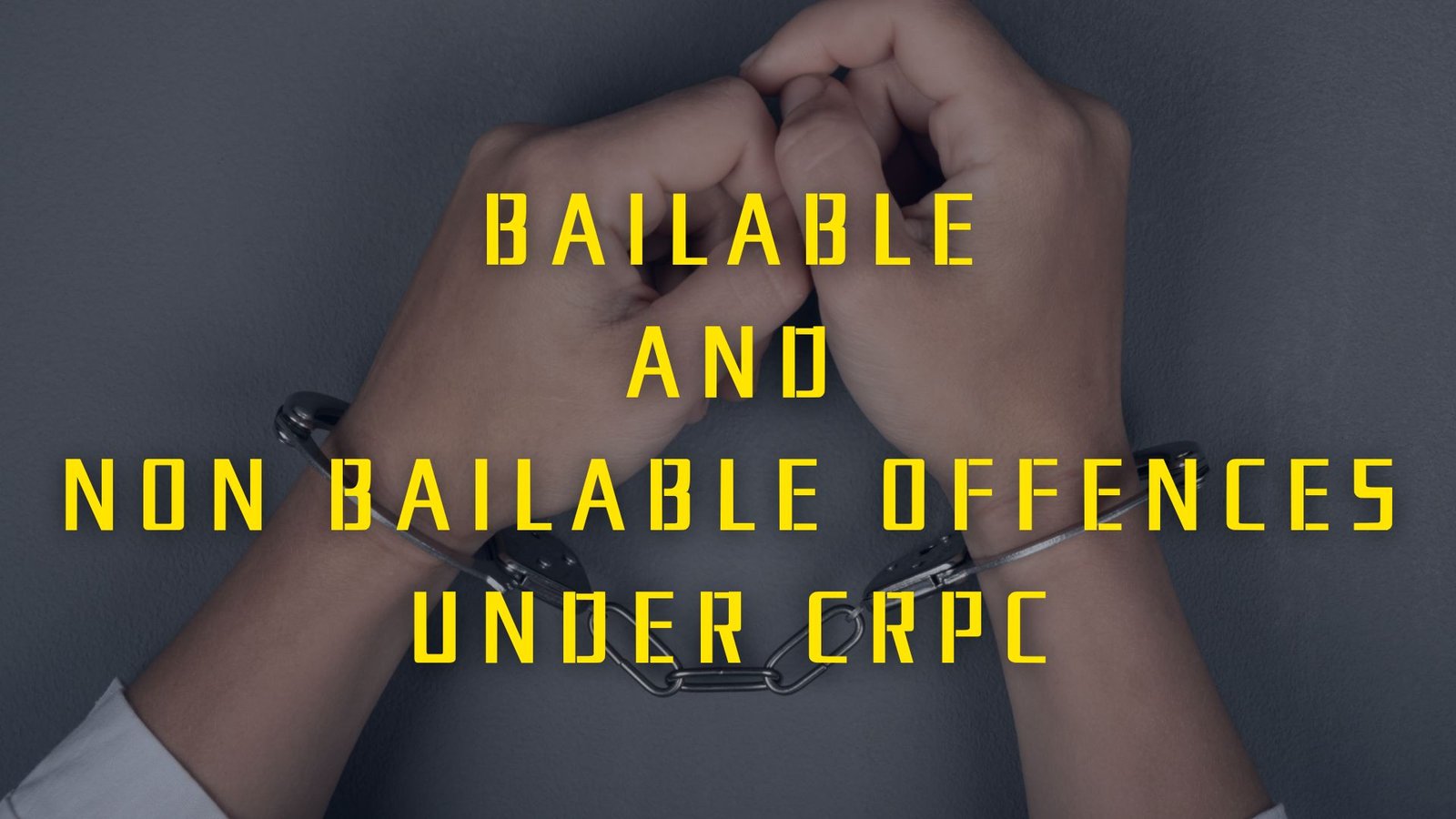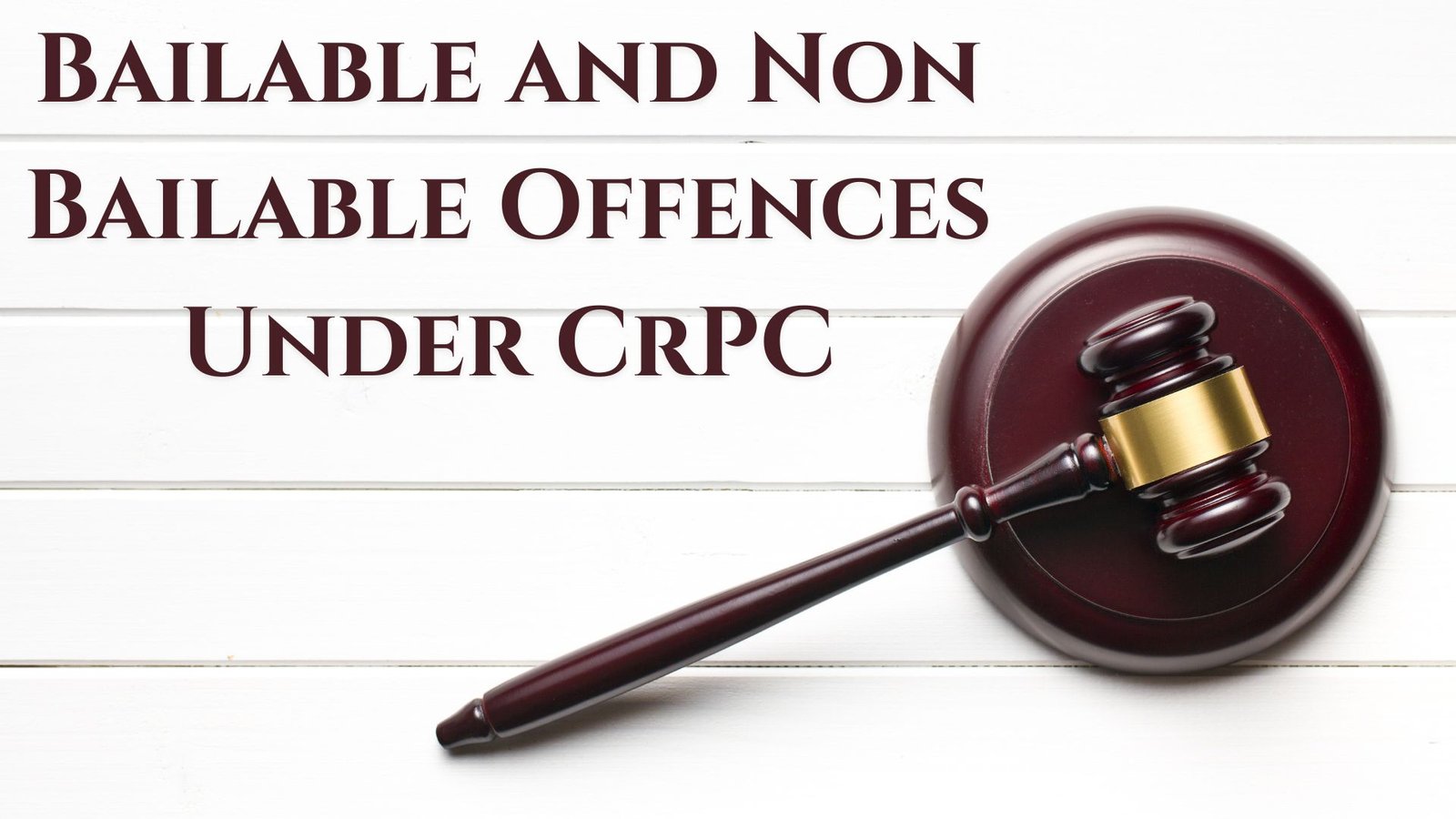On this page you will read detailed information about Bailable and Non Bailable Offences Under CrPC.
When arrested, understanding whether the offence is bailable or not determines if you can seek release on bail as a matter of right. Bailable offences allow you to obtain bail and avoid custody under Section 436 of the Criminal Procedure Code (CrPC), while courts have discretion for non-bailable offences under Section 437. As an accused, knowing this difference is imperative to seek release and understand your rights when arrested. This 101-word article explains the meaning of bailable and non-bailable offences and outlines key contrasts between the two under the CrPC that you should comprehend. Through examples of specific bailable and non-bailable offences, you will gain clarity on these important concepts.
What Are Bailable and Non Bailable Offences?
Offences under the Indian Criminal Procedure Code (CrPC) are classified as bailable or non-bailable. This classification determines whether police are authorized to grant bail to an accused person after arrest.
Bailable Offences
- Bailable offences are less serious crimes where police can release the accused on bail without requiring court approval.
- Common bailable offences include minor theft, simple assault, public nuisance, and low level drug possession charges.
- The police officer has discretion to determine bail requirements like monetary payment or property bond for the accused’s release.
Non Bailable Offences
- Non-bailable offences comprise more serious crimes such as rape, murder, kidnapping, and aggravated assault.
- For these crimes, only a court has authority to grant bail to the accused. The police cannot offer bail.
- Courts consider factors like flight risk, case evidence, criminal history and public safety when deciding bail terms and conditions.
- An accused in a non-bailable case can apply for bail directly in court after arrest. But release is not guaranteed.
Checking if an offence is bailable or non-bailable as per the CrPC code section is important. It indicates whether police or courts control bail for the accused. Understanding this distinction also helps anticipate likely procedures after arrest.
In the previous post, we had shared information about Understanding Culpable Homicide in the Indian Penal Code, so read that post also.
Key Differences Between Bailable and Non Bailable Offences
Under the Criminal Procedure Code (CrPC), offences are categorized as bailable or non-bailable. This classification determines whether police can grant bail at the time of arrest, or bail requires a court order.
How Police Handle Bail for Each Type of Offence
- Bailable offences: Police can release the accused on bail as per provisions under Section 436 of CrPC. Police are not required to produce the accused in court for offences punishable with imprisonment for less than 7 years.
- Non-bailable offences: Only a court or magistrate is empowered to grant bail for these offences under Section 437 of CrPC. Police must produce the accused in court within 24 hours of arrest. Courts have discretion in granting bail by assessing case facts.
Key Differences
The table below summarizes some major differences:
Criteria Bailable Offences Non-Bailable Offences Right to bail It is a matter of right. Police can grant bail as long as sureties are furnished. Accused must apply for bail in court. Granting bail is at court’s discretion based on case merits. Seriousness of offence Generally less serious offences More serious offences Punishment threshold Offences punishable with imprisonment up to 3 years Offences punishable with imprisonment for 3 years or more Examples Simple hurt, mischief, criminal trespass Rape, kidnapping, murder, sedition
So in summary, bailable offences allow accused to secure bail more easily from police station compared to non-bailable offences which require approaching courts. Courts can exercise discretion in granting bail depending on severity of the offence.
List of Bailable Offences Under CrPC
Under the Indian Criminal Procedure Code (CrPC), offences are categorized as bailable or non-bailable. Bailable offences are less serious crimes where the accused has the right to be released on bail.
As per Section 436 of the CrPC, when a person is arrested or detained without warrant for a bailable offence, they may be released at the police station on executing a bond with or without sureties. The bond amount will be specified by the officer-in-charge of the police station.
Some common bailable offences under the CrPC include:
- Simple hurt (Section 323) – This involves voluntarily causing hurt without weapons or means to cause death/grievous hurt. The maximum punishment is 1 year jail and/or fine.
- Assault or use of criminal force (Section 352) – Using assault or criminal force otherwise than on grave provocation. Punishable by imprisonment up to 3 months and/or fine.
- Mischief (Section 427) – Mischief causing damage up to Rs 50 to any property or valuable security. The punishment is imprisonment up to 2 years and/or fine.
- Criminal trespass (Section 447) – Entering someone’s property/land without permission in order to commit an offence or intimidate others. The maximum term is 3 months jail and/or fine.
- Insult intended to provoke breach of peace (Section 504) – Insulting someone in a public place with the intention of provoking them to commit an offence. The penalty is imprisonment for 1 year and/or fine.
There are many other bailable offences listed throughout the CrPC including counterfeiting currency or stamps, unlawful assembly, public nuisance, and disobedience of an order promulgated by a public servant.
Those accused of bailable offences have the right to apply for and obtain regular bail under Section 436 or anticipatory bail under Section 438 of the CrPC. Granting bail is at the discretion of the public prosecutor or judge based on factors like gravity of crime, evidence, character, health, age and criminal background of the accused.
List of Non-Bailable Offences Under CrPC
Under the Indian Code of Criminal Procedure (CrPC), certain offences are designated as non-bailable. This means that for these offences, bail cannot be claimed as a matter of right. Police and judiciary have the discretion to grant or refuse bail in non-bailable cases.
Some key non-bailable offences under CrPC include:
- Offences related to illegal arms and ammunition: Unlawful import/export, manufacture, sale, transportation of firearms or other prohibited weapons.
- Kidnapping and abduction: Wrongfully confining a person or enticing a minor under 16 years of age.
- Rape and sexual assault: All offences under Sections 376 and 376A-D of the Indian Penal Code, including rape, gang rape, custodial rape.
- Human trafficking: Selling or buying minors for prostitution, unlawful compulsory labor, slavery.
- Terrorist activities: Acts threatening the unity, integrity, and sovereignty of India. Offences related to terrorist organizations.
- Drug trafficking: Illegal production, manufacturing, extraction, preparation, refinement, transportation, consumption, use, purchase, possession, sale of narcotic drugs and psychotropic substances.
The list of non-bailable offences varies across different laws and amendments. The courts also have the power to treat any bailable offence as non-bailable based on case merits.
Those accused of non-bailable offences may apply for bail in sessions court or high court. Bail is granted on a case-by-case basis depending on factors like gravity of crime, evidence, past criminal record, likelihood of fleeing, and others.
What Happens After Arrest for Bailable vs Non-Bailable Offences?
There is an important difference in what happens after an arrest when the offence is bailable versus when it is non-bailable. The main distinction lies in whether the accused can obtain bail immediately or has to apply for it in court.
Bailable Offences
- If you are arrested for a bailable offence, you have the right to be released on bail by the police upon paying the required surety amount specified in the First Schedule of the CrPC.
- The police are obligated to inform you of this right. You can secure bail at the police station itself, without needing a court order.
- If the police refuse bail, you can apply to the Magistrate who must grant bail after taking requisite sureties. Bail should ordinarily be granted in bailable offences unless there are special circumstances.
Non-Bailable Offences
- For non-bailable offences, the police do not have the authority to grant bail. You will be taken into judicial custody.
- To obtain bail for non-bailable offences, your lawyer has to petition the sessions court or High Court and convince the judge to grant you bail.
- Bail may be granted or denied based on the arguments made and the judge’s discretion after considering factors like flight risk, destruction of evidence, influencing witnesses etc.
- If bail is denied, you will remain in custody until the chargesheet is filed and the case comes up for trial. Jail term may last from a few weeks to a few years in exceptional cases.
So in summary, the key difference lies in when and how bail can be availed based on whether the offence is legally classified as bailable or non-bailable under the CrPC.
Applying for Bail in Non-Bailable Offences
When arrested for a non-bailable offence under the Criminal Procedure Code (CrPC), obtaining bail is more complex. However, you still have the right to apply for bail.
- Submit your bail application to the sessions court or high court. The police generally cannot grant bail for non-bailable offences on their own.
- Under Section 437 of the CrPC, courts have discretion to grant bail if you are able to show sufficient cause. The court examines factors like:
- Your background and criminal record
- The severity, facts and circumstances of the offence
- Possibility that you may tamper evidence or influence witnesses
- Likelihood of fleeing or absconding if released on bail
- Hire an experienced criminal lawyer to increase chances of getting bail. They can effectively argue your application by highlighting mitigating circumstances and assuring the court you will not repeat the offence or obstruct justice.
- Be prepared to submit personal or financial surety bonds as directed by the court. This acts as guarantee that you will appear for trial if released on bail.
- Follow all terms and conditions imposed by the court, like appearing on given trial dates or surrendering passport to prevent flight risk. Violating bail terms can result in cancellation of bail or separate offences.
While more difficult for serious non-bailable offences, applying for regular or anticipatory bail is not impossible if you take necessary steps. Consult an attorney to use all available legal remedies.
Factors Courts Consider for Bail in Non-Bailable Cases
Under the Criminal Procedure Code, offences are categorized as bailable or non-bailable. While bail is a matter of right in bailable offences, courts have discretion to grant bail in non-bailable cases. When considering bail applications in non-bailable offences, courts examine various factors relating to the accused as well as the specific circumstances of the case.
- The primary factor courts consider is whether the accused is likely to abscond or evade the due process of law. The court will assess if the accused has a permanent place of abode and sufficient roots in the community indicating they will make themselves available for trial.
- Another major factor is the possibility of the accused tampering with evidence or influencing witnesses if released on bail. The court has to weigh if it is necessary to keep the accused in custody to prevent obstruction of justice.
- Courts also take into account the criminal antecedents and track record of the accused. Bail is less likely to be granted to habitual offenders. However, first-time offenders are dealt with more leniently.
- The severity of the punishment upon conviction is also considered relevant, with courts less inclined to grant bail in grave and heinous offences punishable with life imprisonment or death.
- Courts may additionally consider factors like the health, age, or gender of the accused while deciding bail applications in non-bailable cases. For instance, bail pleas of sick, elderly or pregnant persons may be dealt with sympathetically.
- The stage of the trial and the possibility of delay in conclusion of proceedings may motivate courts to grant bail even in serious non-bailable offences.
Thus courts undertake a balanced examination of individual circumstances of each case while determining whether to allow bail in non-bailable offences under the CrPC. The scale is tilted in favor of upholding personal liberty protected under the Constitution.
Challenging a Non Bailable Warrant
If you have been issued a non-bailable arrest warrant, you have the right under CrPC to challenge it and apply for anticipatory bail. Here are the steps to take:
- Consult a criminal lawyer. Explain your case details and show them the non-bailable warrant. A good lawyer can help formulate the best legal strategy to challenge it.
- File for anticipatory bail. Your lawyer can file an anticipatory bail application before the sessions court under Section 438 of the CrPC. This essentially requests the court to release you on bail if you surrender.
- Demonstrate to the court that the warrant is unjustified or illegal. Your lawyer has to convince the judge why the warrant should be discharged or bail should be granted. Some grounds can include:
- There is no prima facie evidence to justify the warrant
- The alleged offence is bailable, making a non-bailable warrant illegal
- Your roots in the community mean you are not a flight risk
- Provide additional sureties if required. The court may ask for additional assurances like a personal bond, surety bond or security deposit to consider the bail application favorably.
- Appear on the surrender date. If anticipatory bail gets approved, make sure to appear before the investigating officer within the granted period, usually 30 days, along with your lawyer and any required sureties. This transforms the warrant into a regular bail order.
- File for regular bail if surrender doesn’t happen in time. If you miss the surrender date, the non-bailable warrant stays active. In this case, apply for regular bail under Section 439 of the CrPC after arrest.
The key is to act fast and have an experienced criminal lawyer argue why the courts should revoke the non-bailable warrant or allow you bail. With a strong legal strategy, an unjustified warrant can be challenged.
FAQs on Bailable Offences: Your Top Questions Answered
Bailable offences are crimes that are considered less severe under Indian Penal Code. If police arrest someone for a bailable offence, they can secure bail from the police station itself. For non-bailable crimes, bail is at the discretion of the court.
Some common bailable offences include rioting, affray, certain theft cases, voluntarily causing hurt, wrongful restraint etc. Simple assault or creating public nuisance also fall under bailable offences.
The court considers factors like severity of crime, past criminal record, probability of accused showing up during trial etc. while granting bail even for bailable offences. Terms like depositing passport or paying a security fee may be levied.
Yes, bail can be denied in certain cases, such as if the court has reasonable grounds to believe the accused will tamper evidence or influence witnesses if released. Severity of crime is also considered.
The accused or lawyer needs to submit a bail application to court justifying reasons for granting bail. Relevant documents proving identity, permanent address, evidence to not tamper with case etc. need to be provided.
If bail terms like appearing on court dates or restrictions on travel are violated, the bail stands cancelled. The accused can be arrested again and may find it more difficult to secure bail once more.
Familiarizing yourself on specifics of bailable offences under CrPC is advisable if you ever encounter legal issues where bail applies. Consulting an experienced lawyer can also help safeguard your rights.
Familiarizing yourself on specifics of bailable offences under CrPC is advisable if you ever encounter legal issues where bail applies. Consulting an experienced lawyer can also help safeguard your rights.
Conclusion
As you have read, the difference between bailable and non-bailable offences as defined under the Criminal Procedure Code is an important concept to understand for any citizen. By comprehending which offences are bailable or non-bailable, you can better safeguard your rights if you ever face criminal charges. We hope this overview has provided helpful knowledge so you now grasp the key distinctions regarding arrest and bail under Indian law. Going forward, you can refer back to this guide if you or someone you know faces potential detention. Equipped with this new understanding, you will be prepared to navigate the legal system’s protocols for bailable and non-bailable crimes.
Disclaimer
The information and services on this website are not intended to and shall not be used as legal advice. You should consult a Legal Professional for any legal or solicited advice. While we have good faith and our own independent research to every information listed on the website and do our best to ensure that the data provided is accurate. However, we do not guarantee the information provided is accurate and make no representation or warranty of any kind, express or implied, regarding the accuracy, adequacy, validity, reliability, availability, or completeness of any information on the Site. UNDER NO CIRCUMSTANCES SHALL WE HAVE ANY LIABILITY TO YOU FOR ANY LOSS OR DAMAGE OF ANY KIND INCURRED AS A RESULT OR RELIANCE ON ANY INFORMATION PROVIDED ON THE SITE. YOUR USE OF THE SITE AND YOUR RELIANCE ON ANY INFORMATION ON THE SITE IS SOLELY AT YOUR OWN RISK. Comments on this website are the sole responsibility of their writers so the accuracy, completeness, veracity, honesty, factuality and politeness of comments are not guaranteed.
So friends, today we talked about Bailable and Non Bailable Offences Under CrPC, hope you liked our post.
If you liked the information about Bailable and Non Bailable Offences Under CrPC, then definitely share this article with your friends.
Knowing about laws can make you feel super smart ! If you find value in the content you may consider joining our not for profit Legal Community ! You can ask unlimited questions on WhatsApp and get answers. You can DM or send your name & number to 8208309918 on WhatsApp









